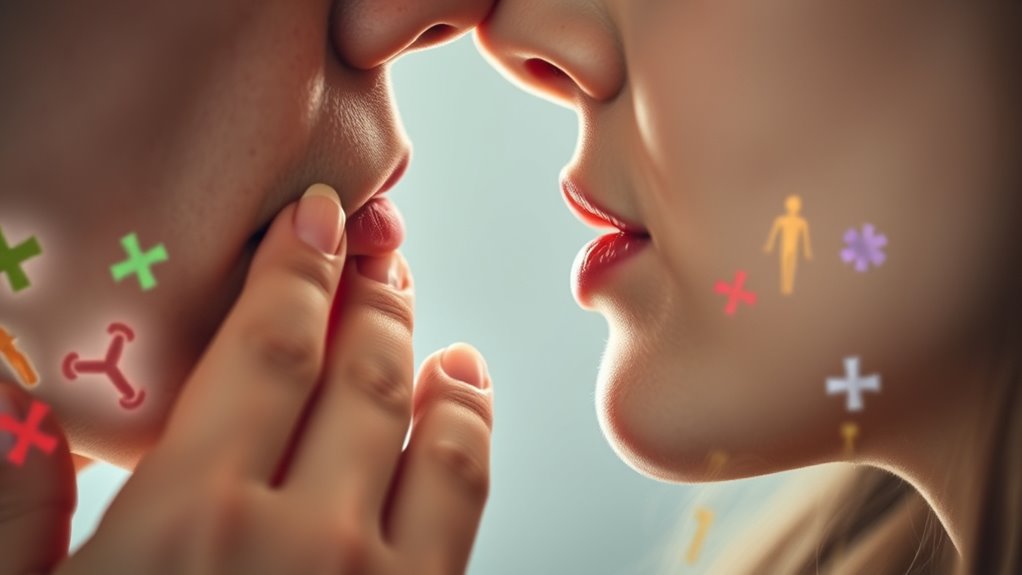If you find yourself reacting suddenly to kisses—swelling, hives, or difficulty breathing—you might be experiencing a rare kissing allergy. This occurs when saliva proteins trigger your immune system, causing physical symptoms and making intimacy feel risky. It’s not about emotional issues but a biological response. Understanding this can help you navigate affection more confidently. If you’re curious, you’ll discover ways to identify and manage this unusual allergy as you explore further.
Key Takeaways
- Kissing allergies are rare immune responses to saliva proteins, causing symptoms like swelling and respiratory issues.
- These allergies can impact intimacy by causing fear of allergic reactions during close contact.
- Diagnosis requires specialized allergy testing; treatment includes avoidance and antihistamines.
- Recognizing kissing allergies helps address emotional barriers and reduces misunderstandings in relationships.
- Advances in allergy diagnostics and awareness improve confidence and safety in physical intimacy.

Have you ever wondered if your fear of intimacy or difficulty trusting others might stem from an allergy—yes, an allergy—to love? It sounds unusual, but some people experience genuine physical reactions to kissing or close contact, which can be mistaken for emotional blocks or personal issues. These rare cases involve what’s called a kissing allergy, where exposure to saliva or skin contact triggers allergy symptoms. Instead of typical sneezing or itchy eyes, your body reacts with symptoms like swelling, hives, or even respiratory issues. This can make intimacy feel risky or uncomfortable, leading you to avoid closeness altogether.
Some people have a rare kissing allergy that causes physical reactions and impacts intimacy and trust.
When you encounter kiss reactions, your immune system perceives certain proteins in saliva as threats. As a result, your body releases histamines, causing allergy symptoms such as itching, swelling, or skin rashes. Sometimes, these reactions are mild—like a tingling sensation or slight redness—but in more severe cases, they can escalate to difficulty breathing or anaphylaxis. If you notice persistent symptoms after kissing or close contact, it might not just be nerves or emotional baggage. Instead, it could be a rare allergic response that’s biologically rooted, making intimacy physically uncomfortable or even dangerous.
This allergic reaction isn’t common, but it’s real. It can develop unexpectedly or persist over time, especially if you’re exposed repeatedly. Some individuals report that their allergy symptoms are more intense after certain foods or medications, which could influence the severity of their reactions to saliva. For some, just the thought of kissing triggers anxiety, because they fear the allergy symptoms might flare up. This creates a vicious cycle—fear of physical reactions leads to emotional distance, which then hampers intimacy and trust. Recognizing that these reactions might be allergy-related can be an eye-opener, shifting the focus from emotional shortcomings to biological realities.
Advancements in AI in Education have led to improved diagnostic tools, which could someday help identify rare allergies more efficiently. If you suspect a kissing allergy, consulting an allergist is essential. They can perform tests to identify specific triggers and recommend treatment options, such as antihistamines or avoidance strategies. Understanding your allergy symptoms helps you communicate with partners openly, reducing misunderstandings and preventing accidental exposure. While rare, kissing allergies highlight how complex and interconnected our physical and emotional health are. Knowing the facts can empower you to navigate intimacy more confidently, addressing both the biological and emotional factors that influence your relationships.
Frequently Asked Questions
Can Kissing Allergies Be Inherited Genetically?
Kissing allergies can sometimes be linked to genetic predisposition, meaning hereditary factors might play a role. If someone in your family has allergies to certain foods or substances, you could be more likely to develop similar sensitivities. While it’s not guaranteed, your genetic makeup may influence how your immune system reacts to saliva or other allergens during a kiss. Consulting an allergist can help determine if your allergies are inherited.
What Specific Foods or Substances Trigger Kissing Allergies?
Imagine your lips as a delicate dance floor, where certain foods and substances can cause an allergic misstep. You might react to food sensitivities like nuts, strawberries, or dairy, which can trigger kissing allergies. Pollen exposure also plays a role, making your lips hypersensitive during allergy season. These triggers set off immune responses, turning what should be a sweet kiss into a fiery encounter with swelling, itching, or discomfort.
Are There Any Long-Term Health Risks From Kissing Allergies?
You might wonder if kissing allergies pose long-term health risks. While rare, they can cause repeated allergic reactions, leading to potential skin issues or respiratory problems if untreated. The emotional impact can be significant, affecting your confidence and relationships. Social considerations also come into play, as you may avoid intimacy to prevent reactions. Consulting an allergist helps manage symptoms and reduces risks, allowing you to enjoy closeness without worry.
How Effective Are Antihistamines for Kissing-Related Allergic Reactions?
Antihistamines can be a lifesaver when it comes to kissing-related allergic reactions, but their effectiveness varies like a rollercoaster ride. They often reduce symptoms caused by pollen exposure or skin reactions, helping you enjoy intimate moments without the chaos. Still, they don’t work for everyone and might not stop severe reactions. So, while they can ease mild symptoms, consulting an allergist is your best bet for tailored relief.
Can Kissing Allergies Develop Suddenly Without Prior Symptoms?
You might wonder if kissing allergies can develop suddenly without warning. Yes, they can, especially if your pollen sensitivity or mold exposure changes over time. New allergies can emerge even if you’ve previously had no reactions. Environmental factors like increased pollen or mold levels might trigger a sudden allergic response. Stay aware of your symptoms, and consult an allergist if you notice unexpected reactions, even without prior signs.
Conclusion
So, next time your heart races or your lips tingle unexpectedly, remember love can sometimes be a rare allergy hiding in plain sight. Just like a tricky puzzle, these allergies remind us that even in matters of the heart, surprises can pop up. Don’t ignore the signs—listen to your body’s whispers. Love might be sweet, but it’s always wise to keep an eye out for those unexpected allergic reactions trying to steal your romantic thunder.









